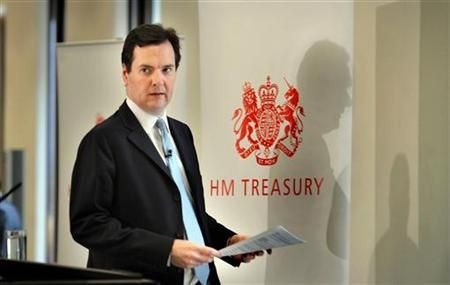UK's austerity measures will cause a surge in jobless benefits

U.K. implemented the biggest cuts seen since the World War II in an attempt to reduce the massive budget deficit but the hidden costs of the drive could offset much of the savings from the austerity drive.
U.K.'s austerity drive will cost the government more than expected in welfare benefits, according to official forecasts.
About 490,000 jobs are expected to be cut in the public sector over the next four years because the country had 'run out of money', according to the Chancellor George Osborne.
The government expects savings of 83 billion pounds over the next four years from the drive.
However, given higher taxes and inflation, the government will now need to shell out 700 million pounds more than previously anticipated.
The government has introduced higher VAT, effective from Tuesday. The analysis from the Office for Budget Responsibility shows that slowing economic growth will make it harder to reduce the deficit by forcing more people to seek state support, The Guardian reported.
The austerity drive, particularly the job cuts, have drawn immense criticism from the government. Welfare payments are the hardest hit in the drive, and the government intends to cut this down by scrapping child benefits for high-income families as well as cap payments for the jobless.
The report on Guardian states that a higher number claiming unemployment benefits or falling into lower wage brackets will see the government needing to spend another 700 million pounds in housing assistance over the next four years.
Most of Britain expects inflation to soar higher in 2011, according to a survey released by the Bank of England in December.
Most Britons expect inflation to be around 3.9 percent in 2011, according to the survey.
Containing inflation has been one of the biggest challenges for the BoE. Inflation has remained over the 2 percent target at 3.3 percent in November.
Food prices have been the biggest problem so far for inflation but the VAT will overshoot this issue in the coming months.
A higher rate of unemployment could hamper Briton's ambitious plans of reducing the deficit, as consumer spending also slows during the year.
Further impact is also expected to see in the housing market, yet another important component for economic growth.
Labour Leader Ed Miliband is expected to hit the campaign trail this week, with VAT as the top most issue on the agenda.
A Conservative government would make the average British family pay 389 pounds extra in VAT a year, the Guardian said, stating the Labour Party's view.
In a speech tomorrow, Miliband will say that families will pay 7.50 pounds a week because of the Liberal Democrats' broken promise, the newspaper said.
© Copyright IBTimes 2024. All rights reserved.





















